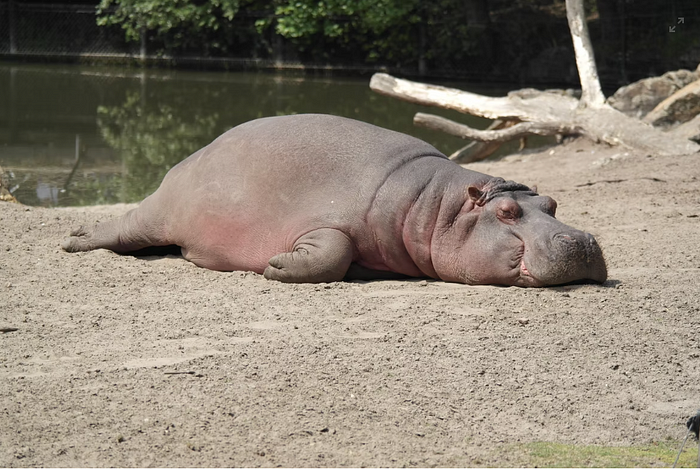

The Failed Teddy Roosevelt Backed Plan To Raise Hippos As A U.S. Meat Source- La...
source link: https://historianandrew.medium.com/the-failed-teddy-roosevelt-backed-plan-to-raise-hippos-as-a-u-s-meat-source-lake-cow-bacon-e3c64c55c225
Go to the source link to view the article. You can view the picture content, updated content and better typesetting reading experience. If the link is broken, please click the button below to view the snapshot at that time.

Image via Unsplash.com- Tim De Pauw
The Failed Teddy Roosevelt Backed Plan To Raise Hippos As A U.S. Meat Source- Lake Cow Bacon
In in the 1910s, Americans were eying hippos and other African animals as potential solutions to shortages and problems in the States
Ideas often sound good in the moment, but over time can lose the sparkle of brilliance and practicality that once seemed so obvious. There have been many big ideas of innovation in the history of the United States, but one of them that was decidedly a dud was a plan backed by Teddy Rossevelt and a number of other politicians to import and raise hippopotamuses in the United States as a new source of meat and as a solution to a growing ecological problem.
Throughout American history, people hunted hard for both food sources and also due to pelts and the eradication of nuisances. As a result, by 1910 a possible meat shortage was staring the country in the face. Additionally, the south was being ravaged by an invasive plant species — a water hyacinth, which was negatively impacting the ecological system by blocking waterways, which in turn was killing off fish populations
Frederick Russell Burnham believed he had the solution to these problems. A scout, traveler and general adventurer, he had developed a reputation around the world for his varied experience and knowledge. Specifically, he wanted the United States to import animals from Africa to establish them on the other side of the ocean. His proposal was formally published in a 1910 article appearing in the New York Independent, titled Transplanting African Animals.
The outdoorsman explained his theory:
“Africa is a wonderland of animal life to draw from. We can exclude its venomous reptiles and insects and take the useful animals that have worked out from a hard environment to a way to survive. By transportation to our land they would be delivered from their chief natural enemies. To this new world were brought the ass, the cow, the horse, sheep, goat and hog. All of these ran wild at once and thrived, except the sheep, which is and always was a mollycoddle.”
Specifically, Burnham touted the utility of hippos:
“I have had fine specimens of hippo meat sent to me from Africa, and although it had been many weeks on the way, had been quickly and rudely preserved, it was certainly very palatable — what you might call good eating even though it was something to which you were not accustomed. There are some who must cultivate an appetite for oysters and for many different kinds of food. It may be that many would have to get used to hippo meat to like it. But killed under right conditions and cooked properly it is not only good but it is really a delicacy. In flavor it is a blend between good beef and turkey. Sometimes one might say it is a combination of beef and fine sweet pork.”
The press picked up on the campaign for hippo meat and began referring to it as “lake cow bacon.”
A powerful supporter of Burnham came in the form of former U.S. President Teddy Roosevelt. He was not only the old scout’s friend, he also shared an affinity for the outdoors, adventure and exploring new frontiers of the human experience. At one point he committed his “hearty approval and promise of cooperation” when it came to backing the importation of animals — specifically hippos.
While Burnham envisioned African animals being raised around the United States, others had more specific designs in implementing his idea. Robert Broussard, a Louisiana Congressman, was particularly interested in the impact hippos could have on his state when it came to combatting the invasive hyacinth. Showing how much he was on board, he introduced bill H.R. 23261, which called for the allocation of $250,000 to import new animals to the United States. He also co-founded the New Food Society with Burnham in the hopes of whipping up additional interest.
The bill seemed destined to pass. Even respected publications like the Washington Post reported that ships full of hippos would be arriving in just a matter of a few years. However, it was not to be. There was never overwhelming public support and the vote failed — supposedly by a single vote.
Arguments that helped sway the sentiment included the belief that hippo ranches would attract poachers looking to illegally bag trophies. Also, the question was raised of why more land couldn’t be made available to raise more cattle.
Hippos never ended up coming to the United States — at least en masse. They have now become a “vulnerable” species despite Americans never finding out if they actually tasted like beef, pork, turkey, or bacon.
If you have enjoyed reading this article, don’t already have a subscription and would like unlimited access to more of my content and that of other creators covering a wide variety of topics, please consider a Medium membership. Plans are available at just $5 per month, or $50 for a full year. Your continued support is truly appreciated. Please click THIS LINK for more information about how to sign up for your membership today. Thank you!
Recommend
About Joyk
Aggregate valuable and interesting links.
Joyk means Joy of geeK